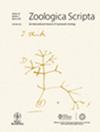Multilocus genetic and morphological phylogenetic analysis: Unveiling a new genus and species in the Tribe Nannenini of jumping spiders (Araneae, Salticidae)
IF 2
2区 生物学
Q2 EVOLUTIONARY BIOLOGY
引用次数: 0
Abstract
Jumping spiders (Salticidae) are a diverse group of non-web-building predators and the most species-rich spider family. The Salticidae Tribe Nannenini consists of a small group of Oriental jumping spiders that are very poorly known. The use of explicit phylogenetic analyses to establish its affinities has so far remained limited. The Nannenini genus Epidelaxia has a peculiar morphology, making its systematic position uncertain. In this study, we present a comprehensive dataset combining molecular and morphological data for Nannenini, including exemplars from all genera. This dataset comprises DNA sequences of approximately 2400 bp, including nuclear genes (18S, 28S and H3) and the mitochondrial gene CO1, sequenced for 40 taxa (20 ingroups and 20 outgroups), along with 61 morphological characters. Notably, both DNA sequences and morphological traits were analysed separately and concurrently for the first time. The Nannenini clade is recovered with high support. Further, Epidelaxia is monophyletic and sister to Tubalaxia gen. n. This is the first hypothesis on the internal phylogenetic structure of Epidelaxia and its placement within the Tribe Nannenini. A new genus Tubalaxia gen. n. and the following new species are described: E. bharathi sp. n., E. somasundaram sp. n., T. castanea sp. n., T. aurea sp. n. The following new combination is proposed: Tubalaxia minuta (Prószyński, 1992) comb. n. Epidelaxia albostellata, E. albocruciata and E. obscura are redescribed. It is worth noting that the newly described species face endangerment due to their limited distribution and small population sizes.多焦点遗传和形态系统发育分析:揭示跳蛛(鹤形目,蝾螈科)Nannenini 族中的一个新属和新种
跳蛛(Salticidae)是一个种类繁多的非织网捕食者群体,也是物种最丰富的蜘蛛科。薮蛛科 Nannenini 族由一小群东方跳蛛组成,对其了解甚少。迄今为止,利用明确的系统发育分析来确定其亲缘关系的方法仍然有限。Nannenini 属中的 Epidelaxia 有着奇特的形态,使其系统定位不明确。在本研究中,我们为 Nannenini 属提供了一个结合分子和形态学数据的综合数据集,其中包括所有属的样本。该数据集包括约 2400 bp 的 DNA 序列,包括核基因(18S、28S 和 H3)和线粒体基因 CO1,测序对象为 40 个类群(20 个内群和 20 个外群),以及 61 个形态特征。值得注意的是,DNA 序列和形态特征首次被分开同时分析。Nannenini 支系得到了高度支持。这是对 Epidelaxia 内部系统发生结构及其在 Nannenini 支系中位置的首次假设。描述了一个新属 Tubalaxia gen:n., E. somasundaram sp. n., T. castanea sp. n., T. aurea sp. n.:Epidelaxia albostellata, E. albocruciata and E. obscura are redescribed.值得注意的是,新描述的物种由于分布有限且种群规模较小而面临濒危。
本文章由计算机程序翻译,如有差异,请以英文原文为准。
求助全文
约1分钟内获得全文
求助全文
来源期刊

Zoologica Scripta
生物-动物学
CiteScore
5.60
自引率
0.00%
发文量
52
审稿时长
>12 weeks
期刊介绍:
Zoologica Scripta publishes papers in animal systematics and phylogeny, i.e. studies of evolutionary relationships among taxa, and the origin and evolution of biological diversity. Papers can also deal with ecological interactions and geographic distributions (phylogeography) if the results are placed in a wider phylogenetic/systematic/evolutionary context. Zoologica Scripta encourages papers on the development of methods for all aspects of phylogenetic inference and biological nomenclature/classification.
Articles published in Zoologica Scripta must be original and present either theoretical or empirical studies of interest to a broad audience in systematics and phylogeny. Purely taxonomic papers, like species descriptions without being placed in a wider systematic/phylogenetic context, will not be considered.
 求助内容:
求助内容: 应助结果提醒方式:
应助结果提醒方式:


